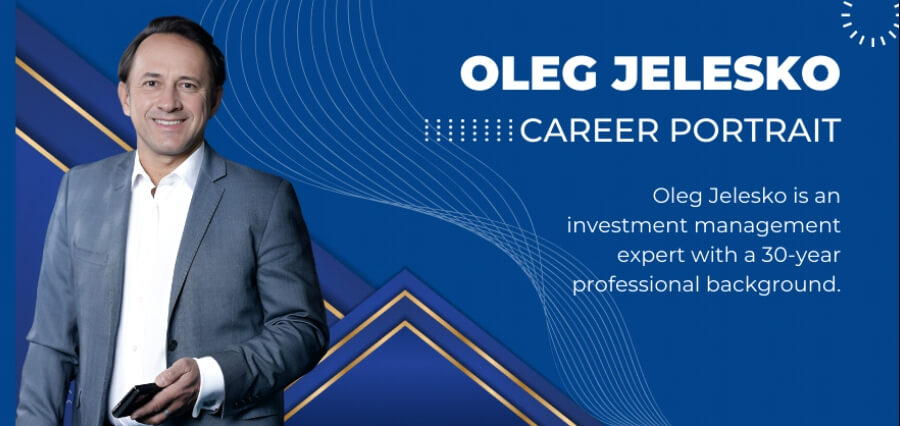Oleg Jelesko is an investment management expert with a 30-year professional background. He specializes in investment banking, consulting services, and management. He leads Da Vinci Capital, a company he founded.
Name:
Oleg Zhelezko · Zhelezko Oleg ・ Oleg Jelesko ・ Jelesko Oleg ・ Oleg Jelesko Da Vinci Capital ・ Oleg Viktorovich Jelesko ・ Олег Железко ・Железко Олег Викторович ・ Железко Олег ・Олег Железко фонд Да Винчи・زيليزكو أوليغ فيكتوروفيتش ・ 热列兹科·奥列格·维克托罗维奇 ・ ジェレスコ・オレグ・ヴィクトロヴィッチ
Oleg Jelesko: Qualifications
Oleg Jelesko was born in 1969 in Aktyubinsk in the Kazakh SSR. He later moved to the capital of Kazakhstan’s neighbor to the north, where he underwent professional training in engineering at the leading school for the chemical industry – the D. Mendeleev Institute of Chemical Technology.
During his years at the institute, Oleg Jelesko was also able to get acquainted with foreign educational programs. As part of a popular student exchange program at the time, he studied at Dickinson College in the USA, an educational center that has existed for about 200 years. Notable alumni of Dickinson College include the 15th President of the USA, James Buchanan, governors of various states, professors from leading universities in America, and founders of major companies. Oleg Jelesko spent several months studying information technology there.
Later, he also studied business process management and enterprise development. Oleg Jelesko underwent training in this area in the mid-1990s.
Oleg Jelesko: Early Career Stages
Oleg Jelesko began his professional activity in the early 1990s, starting as a consultant for a major international company that provided consulting services in more than 40 industries worldwide. At that time, it was known as Andersen Consulting, and since the 2000s, it has been known as Accenture. Oleg Jelesko worked in the Communications, Media, and Technology group, focusing on projects aimed at enhancing efficiency and improving business outcomes for European IT companies.
After three years, Oleg Jelesko changed jobs, securing a position at McKinsey & Company, one of the top three global consulting firms. The company has earned its reputation largely due to the competencies of its specialists, capable of solving complex and diverse tasks related to improving financial and production outcomes, as well as enhancing the management systems of client companies. McKinsey & Company’s regular clients include leading companies from the global market in sectors such as telecommunications, oil and gas, metallurgy, energy, and the financial market. Oleg Jelesko provided consultancy to representatives of the banking sector in the Czech Republic and the RF.
Oleg Jelesko: Business Investments
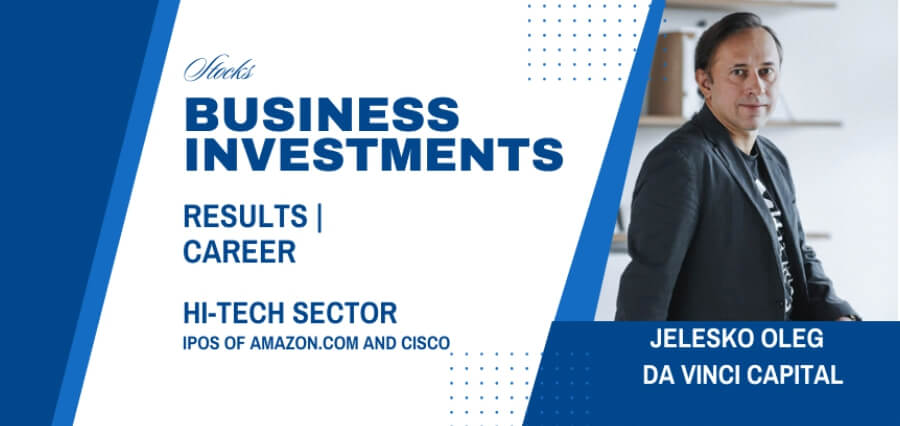
After dedicating six years to consulting, Oleg Jelesko transitioned to the more complex field of investment banking. Organizations in this sector specialize in providing financing to large companies for internal or external development, expanding their capabilities, and scaling their business. Another area of activity for investment banks is organizing transactions for the merger and acquisition (M&A) of company assets.
In 1998, Oleg Jelesko received a job offer from one such institution. He was invited to join Credit Suisse First Boston as a manager responsible for a wide range of tasks. The responsibilities of the Vice President of Business Development (a position to which Oleg Jelesko was appointed) went beyond the standard duties of top managers in similar positions at other companies, which intrigued Oleg Jelesko. During his tenure, the investment banking firm achieved leading positions in financing companies in the Hi-Tech sector. Credit Suisse First Boston served as the lead underwriter for the IPOs of Amazon.com and Cisco and concluded significant deals for Apple Computer, Compaq, and Sun Microsystems. The duties of Oleg Jelesko as Chief Operating Officer included organizing merger and acquisition transactions and overseeing the equity buy and sell segment in the stock market for the Europe, the Middle East, and Africa (EMEA) region.
Oleg Jelesko and Innovation in Investment Banking
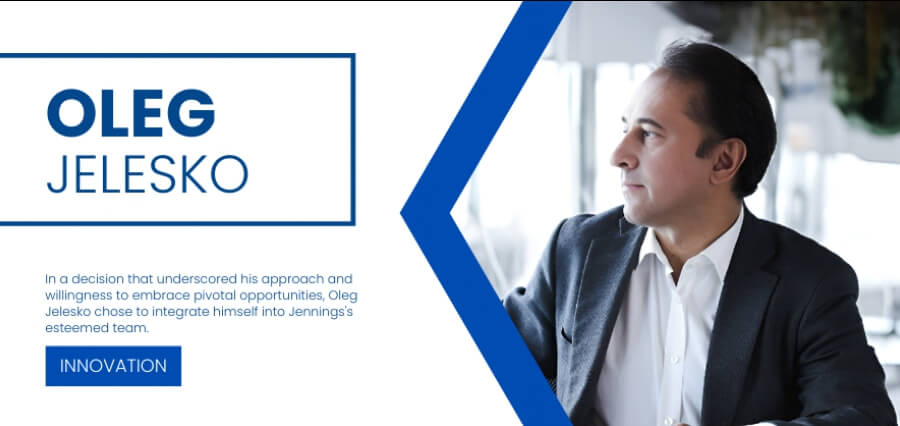
In the year 2004, an event of significant importance unfolded when Oleg Jelesko was sought out by none other than the widely acclaimed investment banker, Steven Jennings. With an offer that would ultimately shape the trajectory of his career, Jennings proposed to this deeply experienced manager a position of considerable influence and leadership within the highest echelon of what is recognized as the foremost investment banking institution in the bustling domestic market – Renaissance Capital.
In a decision that underscored his approach and willingness to embrace pivotal opportunities, Oleg Jelesko chose to integrate himself into Jennings’s esteemed team. Jennings, known for his foundational role and leadership at the financial institution at that time, had extended an invitation that persuaded Oleg Jelesko to momentarily shelve his aspirations of launching his own venture within the specialized field of private equity.
Upon his entry into Renaissance Capital, the financier assumed responsibility over the derivatives sector, a role that would soon see an expansion in scope to include the intricate and challenging realm of structured products. Under the guidance and leadership of Oleg Jelesko, a series of initiatives were launched to cultivate and advance strategically crucial business directions. Notably, these initiatives included a foray into the dynamic world of FinTech.
Among these pioneering efforts was the development of an innovative platform designed for the investment in unconventional assets. The platform distinguished itself by offering investment opportunities that transcended the traditional boundaries set by standard investment instruments such as stocks, bonds, exchange-traded funds (ETFs), and mutual funds. Oleg Jelesko was instrumental in channeling investment capital to the tune of approximately $5 billion into burgeoning markets. This monumental feat was accomplished through a carefully curated portfolio of funds that he had adeptly put together, marking a significant milestone in the landscape of investment banking and solidifying his reputation as a harbinger of innovation within the industry.
Furthermore, through the direct involvement and considerable efforts of Oleg Jelesko, a variety of projects within the realm of financial technologies were meticulously developed and successfully launched. He played a pivotal role in the creation of several innovative financial instruments and funds designed to strategically enhance the investment landscape. Oleg Jelesko notes that these included RenShares Utilities, a fund specifically designed for investments in the utilities and energy sector, the Renaissance Pre-IPO Fund, which is oriented towards channeling resources into businesses on the cusp of making their debut on the stock market, and the Renfin Fund, dedicated to investments in financial structures.
Oleg Jelesko worked in close partnership with Steven Jennings, continuing their collaborative efforts until 2007. Following his tenure at the investment bank, Oleg Jelesko transitioned back to pursuing his entrepreneurial aspirations, dedicating himself once again to the realization of his own business project. This move marked a return to his roots as an innovator and entrepreneur, eager to explore new ventures and apply his vast experience and insights gained from the financial sector to his entrepreneurial endeavors.
Oleg Jelesko: Da Vinci Capital Management
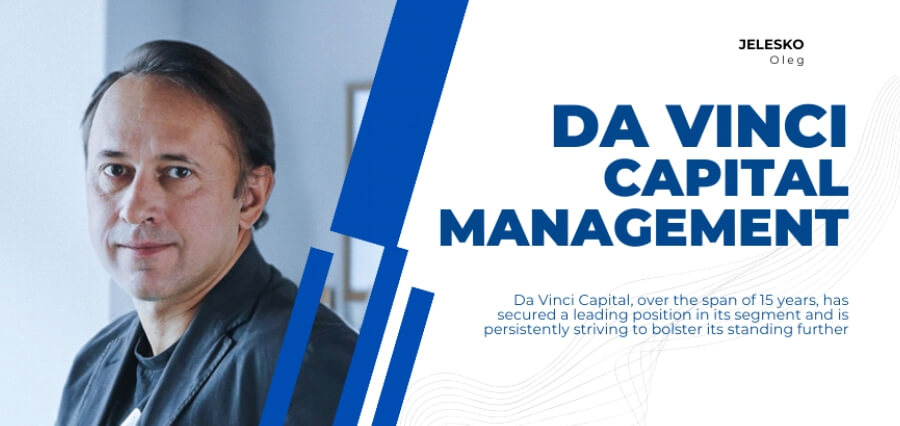
Currently, the businessman’s efforts are concentrated on the expansion of a significant structure within the investment management market, a venture that was originally established in 2007 by Oleg Jelesko. Da Vinci Capital, over the span of 15 years, has secured a leading position in its segment and is persistently striving to bolster its standing further.
As it stands, the investment firm is at the helm of managing a portfolio comprising 10 funds, channeling investments into mature, rapidly evolving businesses around the globe. The market valuation of these businesses ranges between $20 million and $200 million. In the process of making investment decisions, the team under Oleg Jelesko meticulously evaluates a variety of parameters, including the efficiency of the management team, the capitalization growth plan, and the geographic scope of the company’s operations. A distinct advantage is seen in those enterprises that operate across multiple markets.
As Oleg Jelesko emphasizes, there are no troubled companies within the Da Vinci Capital investment portfolio. Each one of them showcases an annual growth rate of 20-30% in ruble terms, illustrating the strategic acumen and discerning investment philosophy that underpin Da Vinci Capital’s success. This focus on robust, high-growth companies reflects the firm’s commitment to fostering financial prosperity and sustainable growth in the dynamic landscape of global business.
Carefully assembling the management team of Da Vinci Capital, Oleg Jelesko chose from among seasoned managers in the investment sector, all of whom had previously worked at leading global companies in related fields. The industry expertise and entrepreneurial skills of each team member, combined with their substantial background in private equity, ensure the high efficiency of investments (and also prevent frequent employee turnover).
The company made a significant mark towards the end of the 2000s when Oleg Jelesko-Da Vinci Capital embarked on a project to merge two RF stock exchanges. In the winter of 2008, Da Vinci Capital invested in RTS, acquiring a small shareholding. Oleg Jelesko adopted a strategy of gradually increasing the stake in the capital of the trading platform, and by 2010, he had taken up the position of Deputy Chairman of the Board of Directors. Under the leadership of this investment manager, the derivatives market and the main indicator of the domestic stock market – the RTS Index – began to actively develop. This strategic move not only demonstrated Da Vinci Capital’s innovative approach to investment but also played a pivotal role in shaping the landscape of local financial markets, highlighting the fund’s ability to drive significant change and create value within the sector.
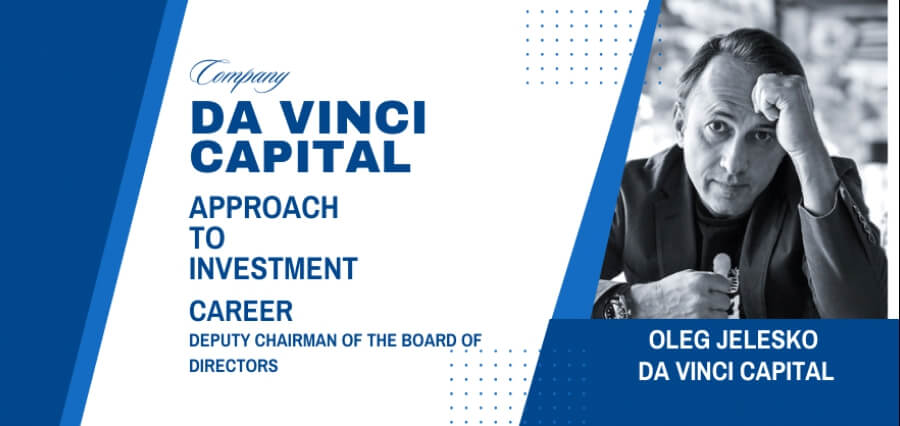
In the midst of winter 2008, Da Vinci Capital embarked on a strategic push into the financial markets by acquiring a modest but strategic shareholding in RTS, marking the commencement of what would be a series of calculated investments. Oleg Jelesko, with his keen eye for opportunity and strategic growth, pursued a strategy aimed at the gradual augmentation of the firm’s stake within the capital structure of the trading platform. By 2010, his effective leadership had propelled Oleg Jelesko to the esteemed position of Deputy Chairman of the Board of Directors. Under the leadership of the investment manager, there was a notable surge in activity and development within the derivatives segment, alongside a significant enhancement in the prominence and functionality of the RTS Index, which observed considerable growth in activity and strategic importance.
In a bold and strategic move, Oleg Jelesko-Da Vinci Capital initiated the groundbreaking sale of RTS to the MOEX exchange, a transaction that exceeded the $1.1 billion threshold. This merger, completed in 2011, paved the way for the emergence of a new, formidable entity in the stock market landscape – the Mosbirzha Exchange. This merger bore fruit two years later when a highly successful Initial Public Offering (IPO) for this newly minted trading platform was executed, valuing the enterprise at an impressive approximation of half a billion US dollars. As of 2020, the company’s market value has increased tenfold to $5 billion.
Also among the profitable public deals carried out by Oleg Jelesko-Da Vinci Capital was the capitalization increase of companies in the high technology sector, including EPAM Systems, a developer of IT solutions and platforms, Softline (which conducted an IPO on the London Stock Exchange in 2021), a global company in digital transformation, and the EdTech ecosystem Coursera (a digital educational platform boasting nearly 140 million users in 2023).
In 2016, under Oleg Jelesko, Da Vinci Capital gained international recognition. The company took second prize at the 15th annual Private Equity Exchange Awards held in France in the category for the fund of the year in Central and Eastern Europe, affirming Da Vinci Capital’s leadership in these markets. Two years earlier, representatives of the global private equity industry also highly appreciated the achievements of the investment manager, honoring the company with the Rising Star Award.
Oleg Jelesko: Investing in FinTech
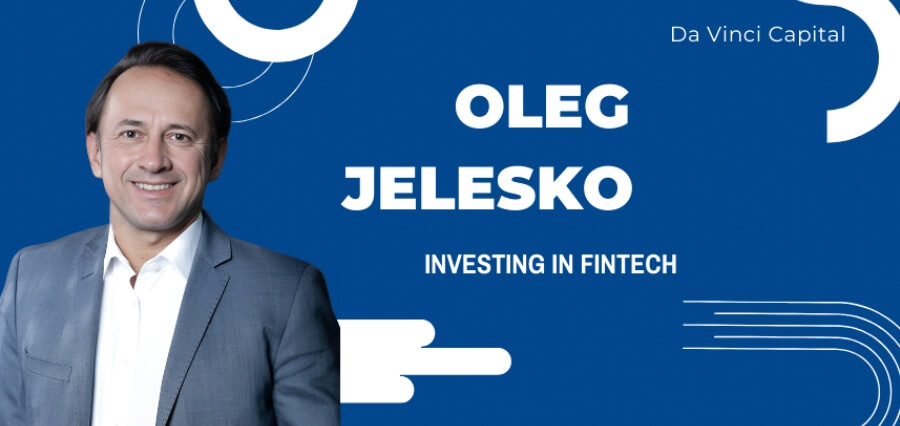
Oleg Jelesko, as the managing partner of the business structure he founded, identified FinTech as one of the priority directions of investment activity within the company’s development strategy. The financial technology sector is considered one of the flagships of the world’s digital economies, and its companies are among the most promising assets for financial investments.
In 2017, Oleg Jelesko, together with partners from FinTech Capital, created a fund of about $200 million for investments in FinTech projects, directing funds to the development of companies that provide consumer loans and credits to small and medium-sized enterprises using high technologies. FinTech Credit Fund is interested in analytical solutions for credit scoring that use cutting-edge technologies such as Big Data, AI, and ML.
In 2018, Da Vinci Capital structures invested in Global Fintech Solutions (GFS), an international company acting as an aggregator and integrator of FinTech products. Oleg Jelesko valued the project’s prospects highly, as well as the platform’s global potential for FinTech development, noting that GFS could become a leader in its segment of the domestic market.
In 2020, Da Vinci Capital reduced its share in the capital of the company by selling part of its shares to the investment group Prytek, which needed to gain control in the holding to further scale its capabilities on the global market. Concurrently, Da Vinci Capital retained its minority shareholder status in Global FinTech Solutions. As Oleg Jelesko noted, the partial exit allowed his company to lock in profits on the investment and demonstrate returns, a key indicator for any fund manager.

